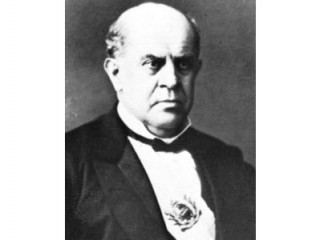
Domingo Sarmiento biography
Date of birth : 1811-02-15
Date of death : 1888-09-11
Birthplace : San Juan, Argentina
Nationality : Argentine
Category : Politics
Last modified : 2011-03-07
Credited as : Politician and statesman, educator and journalist,
The Argentine statesman, educator, and gifted journalist Domingo Faustino Sarmiento was known as the "Teacher President" for his unremitting efforts to foster education in his country. He was also an intuitive writer with a prophetic gift who created a classic of Argentine literature.
Domingo Sarmiento was born on Feb. 15, 1811, in San Juan, an old and primitive town of western Argentina near the Andes, of humble, hardworking parents living in near poverty. His formal education was scanty, and he was largely self-taught, reading whatever came within his reach. Benjamin Franklin's Autobiography exercised a powerful influence on his young mind, and in later life he wrote, "No other book has done me more good than that one." At the age of 15 Sarmiento taught in a country school; later he clerked briefly in a general store with little success, tried his hand at surveying, and entered politics at a youthful age, thus emulating Abraham Lincoln's early life. Sarmiento's features, about which he often joked, were also rugged and homely. Indeed, these statesmen from opposite ends of the Western Hemisphere had a certain affinity, and in the last decades of his life, Sarmiento always kept near him plaster busts of his "household divinities"—Lincoln and the New England educator Horace Mann.
Sarmiento turned to politics with passionate dedication. The independent provinces of Argentina had lapsed into general anarchy, from which emerged the classic Latin American dictatorship of the cruel and despotic Juan Manuel de Rosas. Liberal and constructive elements of society fled into exile, and Sarmiento's opposition soon obliged him to seek asylum in Chile. In that hospitable land he promoted public schools and, with equal passion, assailed the dictator of Argentina with fiery pamphlets and newspaper articles. In the heat of this fray he wrote the classic Civilization and Barbarism; or, The Life of Juan Facundo Quiroga (1845), more succinctly known as Facundo.
This anomalous work in three parts is neither history, biography, a novel, nor sociology, yet it partakes of the characteristics of all of these. The first part is a geographical and social description of the vast pampas, or plains, of Argentina. Isolated cities are oases of civilization in the empty wilderness, over which wild gauchos roam in semibarbarism. The influence of James Fenimore Cooper, particularly his novel The Prairie, is apparent in these pages, and it is of interest to note that neither writer at the time of composition had actually seen the region that he described with intuitive genius. The second part is a melodramatic biography of the caudillo Facundo, who symbolizes the barbarism of the pampas and the tyranny of the despot Rosas. The third part is a program of social and political reorganization after the overthrow of the dictator.
From 1845 to 1848, while Sarmiento was still an expatriate, the Chilean government enabled him to travel in Europe and the United States to study educational systems, and these journeys inspired some of his finest descriptive writing, in Travels in Europe, Africa, and the United States (1849-1851). On returning to Chile he wrote his nostalgic Hometown Memories (1850) to defend himself from political slander, and this work, describing his childhood and early home life, contains some of his most moving pages.
The comments on North American life and ways in his travel book are both humorous and penetrating. They clearly reveal his profound and unfailing admiration for all things American, particularly public education. His veneration for Horace Mann approached adoration and later extended to the Massachusetts educator's widow, Mary Tyler Mann, who became Sarmiento's confidante and correspondent for the remainder of his days.
With the fall of the Rosas dictatorship in 1852, Sarmiento returned from exile to devote his energies with ceaseless intensity to bringing unity and a sense of nationality to his people. From 1865 to 1868 he was again in the United States as minister plenipotentiary of Argentina, during which time he met Emerson, Longfellow, Ticknor, and many other North American notables. The most prized distinction that he received was an honorary doctorate from the University of Michigan in June 1868, on the eve of his return to Argentina to assume the presidency.
Sarmiento's term as chief executive, from 1868 to 1874, was one of frustration owing to the exhausting war with Paraguay and to other circumstances unfavorable for a cherished program of reform. Nevertheless, he did much to advance learning and to promote public schools, including arrangements for American women schoolteachers to go to Argentina under contract to give instruction in the newly established teacher-training institutions and in the primary schools of provincial towns and cities.
Despite a strong reluctance to step down from his high office at the end of his term, Sarmiento patriotically turned over the presidency to an elected successor. Then, in minor positions, he continued to work to unify his countrymen and to prepare them for civic participation. Deafness and ill health saddened his last years. compelling him to spend his winters in the milder climate of Paraguay, where he died on Sept. 11, 1888. Shortly before his death he wrote to a friend: "I must soon start on one last journey. But I am ready … for I carry the only acceptable passport, because it is written in every language. It says: Serve mankind!"
















